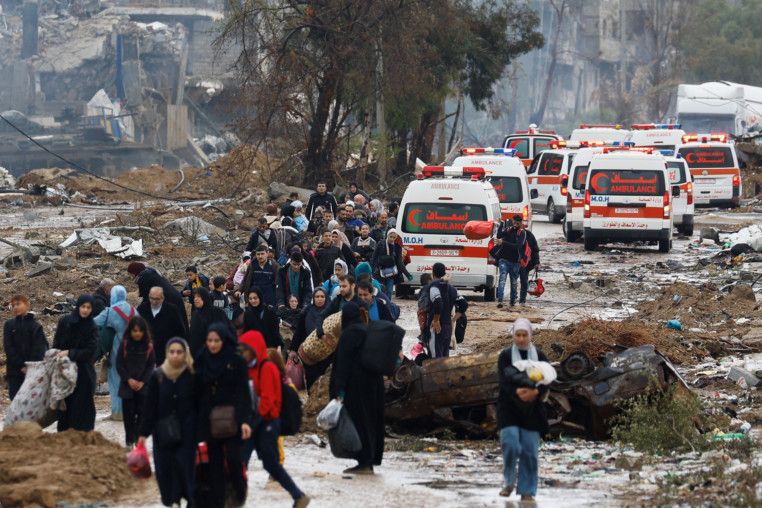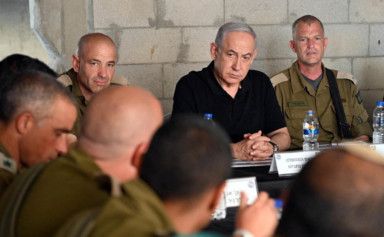
After almost 50 days of relentless Israeli bombing of the Gaza Strip, followed by tentative humanitarian pauses and the possibility of fresh hostilities, attempts to reach a final ceasefire are continuing.
So far, it’s a toss-up; one that will determine the fate of thousands of others already in dire straits. The hope is that US pressure will deliver a permanent cessation of hostilities.
But then what? The world will have to face a number of pressing questions and challenges. Assuming that last minute efforts will bring this dire war to an end, the day after will be difficult for all.
For the international community, there is the immediate challenge of dealing with the catastrophic humanitarian crisis in Gaza. Millions of people have been displaced with nowhere to go. About 40 per cent of the Gaza Strip has been levelled to the ground.
Emergency aid will have to increase by tenfold, and in a sustainable manner, for it to meet the most basic needs of the displaced and injured at a time when winter is setting in.
Future of the Israel/Palestine conflict
Then comes the urgent, but thorny matter of reconstruction. It is not about money, but rather the outcome of political haggling that is set to take place, if and when a ceasefire takes hold. Israel, at this stage, has prevented millions from returning to areas under its occupation in northern Gaza.
The future of this part of the strip remains unknown, even as the Biden administration has said that it is against the forced displacement of Gazans. It will take weeks and probably months to resolve such an intractable issue. And it will be tied to problems such as who will take control of Gaza and replace Hamas and what is the future of this militant group.
Also, the international community — led by the United States and pressured by Arab and Muslim nations — will have to decide what the future of the Israel/Palestine conflict looks like. Will the peace process be revived to finally implement the two-state solution?
That solution looks increasingly difficult to implement in light of the rejectionist position of the current Israeli government. The Oct. 7 attack by Hamas has hardened the Israeli public and recent polls show a significant drop in support for a peaceful resolution to the decades-old conflict.

Creating a political vacuum
One area where such extreme policies are being followed is the West Bank, where the Palestinian Authority (PA), not Hamas, is supposed to be in charge.
The almost daily military incursions into towns and refugee camps in the West Bank are pushing Palestinians to the brink. No one wants to see another round of violence and destruction erupt in the occupied Palestinian territories. And a collapse of the PA at this stage will only serve the agenda of Israel’s Far Right.
Then, one has to consider that the US is going into election mode in a few weeks, and it is difficult to see the Biden administration being willing or even able to pressure Israel to embrace the two-state solution. Biden’s Republican opponents will see such pressure as a betrayal of Israel.
In addition to all that, there will be calls from countries and organisations for an independent investigation of possible war crimes committed by the two sides. The disproportionate Israeli response to the 7 October attack has resulted in the killing of thousands of civilians, half of whom were children and women.
Hamas’ attack has also resulted in civilian deaths. Forgoing such an investigation, which requires political will on the part of the international community, cannot be tolerated. At stake is the fate of the rules-based world order.

End to never-ending cycles of violence
For Israel, there will be an internal investigation into the intelligence and military failures that accompanied the 7 October attack. Netanyahu is likely to fall as a result, creating a political vacuum that many will compete to fill.
Whether Israel will look back and realise that the Far Right has to be contained, that continuous wars will not bring security or peace, and that bold compromises have to be made or not remains to be seen.
For the Arab world, there are lessons to be learnt as well. The resolution of the Palestine Question must happen for the region to benefit from lasting stability and peace while circumventing foreign interference.
It is a no-brainer that providing Palestinians with hope and a realistic political horizon to end the occupation is the only way to curtail militancy and foreign interference.
One has to look at the root cause of why more Palestinians, especially the youth, are becoming radicalised. Ending the occupation and helping Palestinians regain dignity and hope will bring an end to never-ending cycles of violence where no one wins.
Osama Al Sharif is a journalist and political commentator based in Amman








